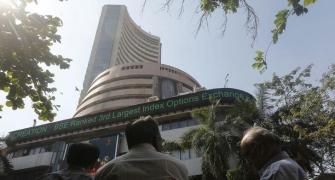Vijay Pokare, owner of a 400 square foot store in Mumbai's Dadar market, knows his onions - literally. Just four months ago, he used to sell just 20 kg of them every day. After the nearby Subhiksha store on the ground floor of Shiv Sena Bhawan closed, Pokare spotted an opportunity and started packing washed onions in two kg plastic bags with a 10 per discount tag. Sales have soared three-fold since then.
In South Delhi's Kalkaji area, a dozen small mom-and-pop stores (known as kirana stores in north and west India) have formed an informal alliance to buy in bulk from fast moving consumer goods giants to get better prices and fight the competition from retail biggies. The strategy worked; companies such as Hindustan Unilever and Godrej started offering higher trade margins.
The friendly neighbourhood stores are fighting back - and how. If the 1,500 square foot store of A P Mani & Sons in the narrow by-lanes of Mumbai's Chembur station have cashiers in smart uniforms working with bar-code readers, Durgaram Choudhary, who owns Panchdeep Market in Pune's Viman Nagar, has extended the free credit period from 30 to 50 days. Panchdeep is even offering free services such as crushing grain at the flour-mill and delivering to customers' homes.
"You have to stoop to conquer," said Choudhary.
Ingenuity is the key here. Pokare, for example, has only studied till standard four, but talks SMS marketing, home deliveries with customer ID numbers, or even loyalty programmes - all modern trade techniques but in a desi way. A few months ago, Pokare began registering customers who walked into his shop for the SMS service. Today, he has a data base of over 1,500 customers who are fond of beauty treatment products and keeps them informed about offers and discount schemes regularly. "No retail giant can afford to give such intensely personalised services," Pokare said.
It's not just a coincidence that most of these initiatives have come at a time when modern retail is battling the slowdown in the economy. Some, like Subhiksha, have downed shutters, others are closing stores, burdened by consumer expectations of more frills compared to the no-frills kirana formats. By some estimates, FMCG sales from modern formats, which grew over 30 per cent in the past two or three years, have been almost flat this year.
Small retailers in India have inherent advantages, said a report titled "Rising Elephant" prepared by PriceWaterhouseCoopers and Confederation of Indian Industry.
"They are located next to the consumer, making it convenient for top-up purchase. They know them well, some even by name. They give credit too - which no large retailer does. Their fixed costs are so low that their breakeven point is as low as 46 per cent of sales," the report said.
"Two years ago, when Sabka Bazaar (owned by Wadhawan Food Retail which runs the Spinach brand of stores) opened in our area, we had lost a lot of our customers as they wanted to buy from air-conditioned stores where they can pick and choose the products of their liking. But we renovated our shop with air conditioning and self-service facility. We are not lagging behind any big chains in terms of convenience and service now," said Rajat Sharma, a shop-owner in South Delhi.
Analysts agree and have already pared the growth projection for organised retail, given the downturn in the economy.
According to a recent study by business consultancy KPMG, the growth in organised retail sales in India may continue to falter for the next 18 months at least. The share of organised retail was expected to grow to just about 10 per cent of the overall retail market by 2012, rather than the 16 per cent estimated earlier, the KPMG report said. Organised retail currently accounts for around 5 per cent of the estimated $350 billion Indian retail market.
"We give what our customers want and at the right price. We do not bombard irrelevant items with offers. Even in grocery, the price of some of our items are actually 5 to 10 per cent lower than their's," said R Ramasubramanian Nadar , co-owner of AP Mani & Sons, who manages around 1,000 customers a day at his store and plans to set up a dozen convenience stores across Mumbai with the help of a private investor.
That new-found confidence prompted Devangshu Datta, chief executive of Third Eyesight, a retail consultancy, to say: "When you go to kiranas, you fulfill your needs but when you visit a modern retail store, you end up buying more than what you need. In a downturn, an increasing number of shoppers think that they do not want to spend more. In that sense, there is a connection between shoppers switching from modern retail to kiranas." Kirana stores said the arrival of "big retail" forced them to offer new things to customers. Rupali Saha of RGN Stores has lit up her store well and now stocks more products than before.
"I realised that consumers go to supermarkets if they do not get what they want on a daily basis from the shop next door. So, I carried out a survey on their daily requirements. For instance, now I also stock reading material for school children and accessories that they need for school-level project-work. Sales have automatically gone up," Saha said. The fast moving consumer goods companies are also increasingly acknowledging the significance of kiranas. For starters, modern retail contributes just 5-9 per cent of revenues of the top FMCG companies such as Hindustan Unilever, Marico, Godrej among others.
"The slower growth of modern retail does not have any impact on our sales. If modern trade growth slows down, traditional trade will take up the slack," said Adi Godrej, chairman and managing director of Godrej Consumer products, which gets nearly eight per cent of its revenues from organised retail.
Additional reporting by Pradipta Mukherjee in Kolkata, Kaustubh Kulkarni in Pune and Sapna Agarwal in Mumbai








